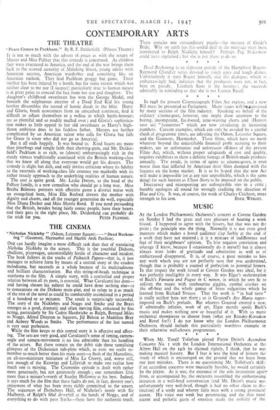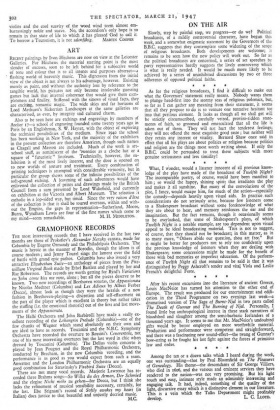MUSIC
AT the London Philharmonic Orchestra's concert at Covent Garden on Sunday I had the great and rare pleasure of hearing a work hissed. I happened to agree with the hissers, but that was not the point ; the principle was the thing. Normally it is not even good manners which makes a bored audience clap feebly at the end of a work they have not enjoyed ; it is a mixture of indifference and fear of their neighbours' opinion. To hiss requires conviction and courage (I know, because I occasionally do it myself) but it almost always wins looks of gratitude and admiration as well as of embarrassed disapproval. It is, of course, a great mistake to hiss any work which you are not perfectly sure that you understand, though that is probably a counsel of perfection to potential hissers. In that respect the work hissed at Covent Garden was ideal, for it was perfectly intelligible in every way. It was Elgar's orchestration of Bach's Fantasia and Fugue in C minor, in which he sees fit to enliven the music with tambourine giggles, cymbal crashes on the off-beat and the whole gamut of brass vulgarities which he learned from Richard Strauss. That the work is "in bad taste" is really neither here nor there ; so is Gounod's Ave Maria super- imposed on Bach's prelude. But whcrca., Gounod created a new, if admittedly. inferior, work of art, Elgar merely spoils Bach's music and makes nothing new or beautiful of it. With so many orchestral showpieces to choose from (what are Rimsky-Korsakov and Ravel for?) I do not know why the London Philharmonic Orchestra should include this particularly worthless example in their otherwise well-chosen programmes.
* * *
When Mr. Toralf Tollefsen played Pietro Deiro's Accordion Concerto No. I with the London International Orchestra at the Albert Hall on the 14th he claimed rightly, I think, that he was making musical history. But I fear it was the kind of history the study of which is encouraged on the ground that we learn from our past mistakes. There is no questioning Mr. Tollefsen's skill : if an accordion concerto were musically feasible, he would certainly be the player. As it was, the entrance of the solo instrument apart' from, or accompanied by, the orchestra resembled the embarrassing intrusion in a well-bred conversation (and Mr. Deiro's music was unfortunately very well-bred, though it had no other claim to dis- tinction) of a seedy and wheezy little man with a strong provincial accent. His voice was weak but penetrating, and the thin nasal accent and pathetic gusts of emotion made the nobility of the
violins and the cool suavity of the wood wind seem almost em- barrassingly noble and suave. No, the accordion's only hope is to remain in that state of life to which it has pleased God to call it.
To borrow a Teutonism, it is not salonfahig. MARTIN COOPER



































 Previous page
Previous page